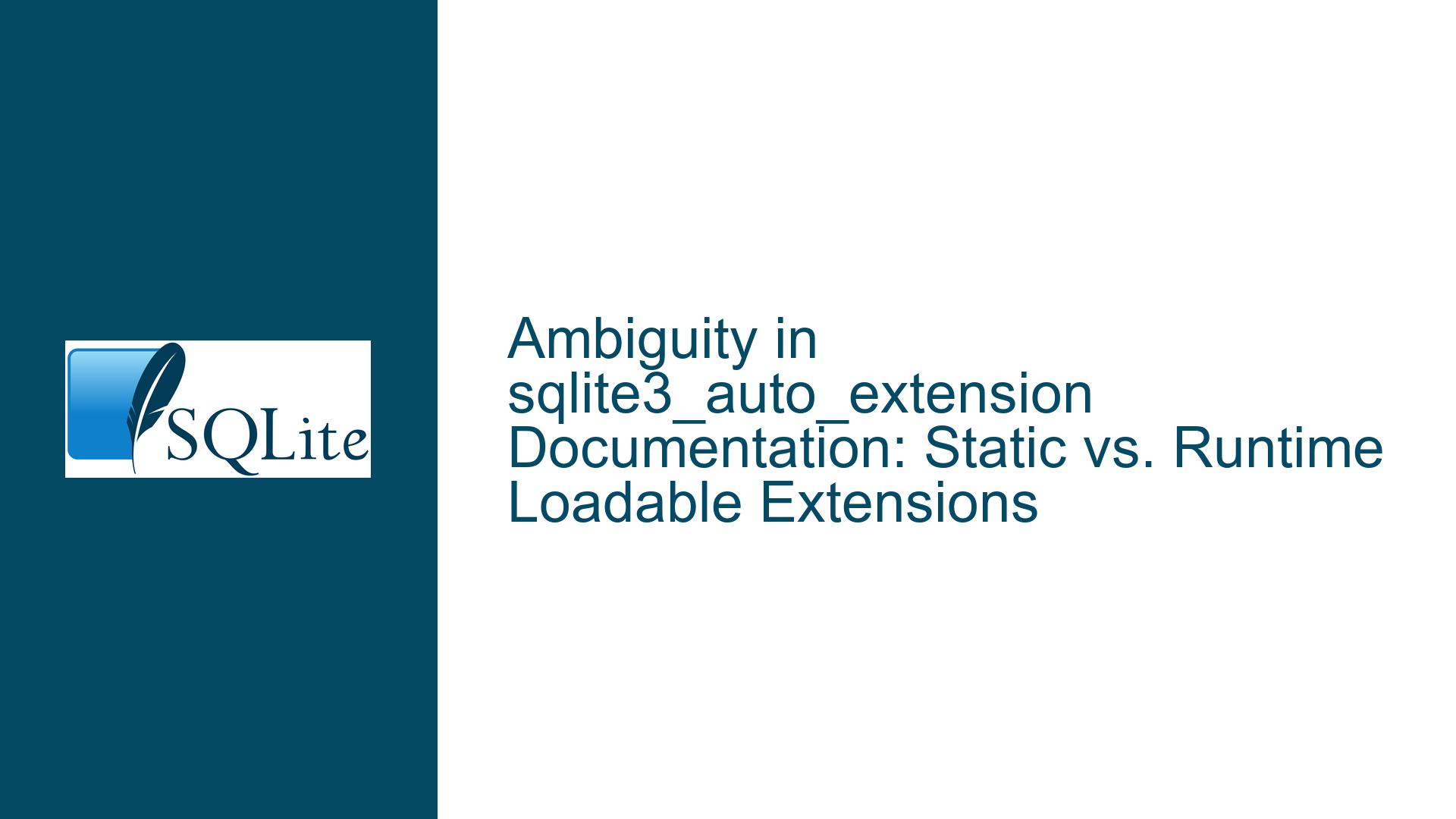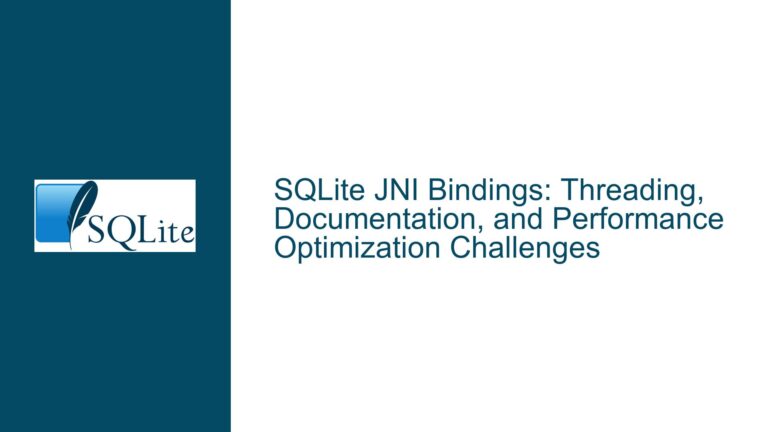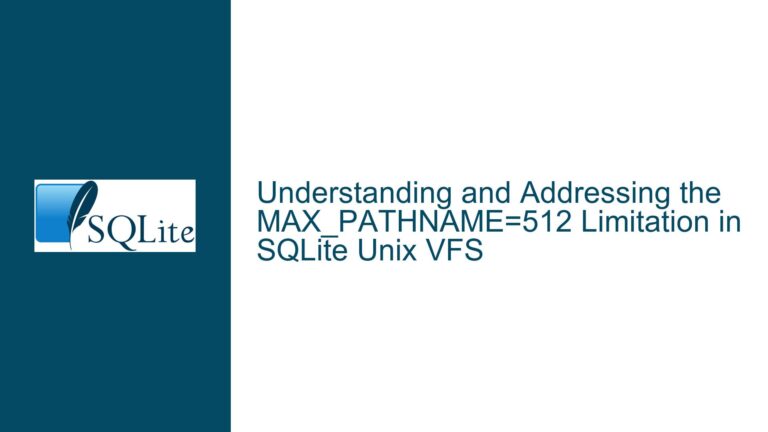Ambiguity in sqlite3_auto_extension Documentation: Static vs. Runtime Loadable Extensions
SQLite3_auto_extension: Static Linking vs. Runtime Loadable Extensions
The sqlite3_auto_extension function in SQLite is a powerful tool for automatically registering extensions whenever a new database connection is opened. However, the documentation surrounding its usage with static versus runtime loadable extensions has led to some confusion. Specifically, the SQLite documentation implies that sqlite3_auto_extension is only applicable to statically linked extensions, while another section suggests that it can also be used with runtime loadable extensions once they have been initialized. This discrepancy has caused ambiguity for developers trying to understand the full scope of sqlite3_auto_extension‘s capabilities.
The core of the issue lies in the interpretation of the documentation. The first document, which discusses sqlite3_auto_extension, strongly implies that the function is only usable with statically linked extensions. This is a reasonable assumption given the context, as statically linked extensions are compiled directly into the SQLite library and are always available at runtime. On the other hand, the second document, which covers runtime loadable extensions, indicates that sqlite3_auto_extension can be used with these extensions once they have been initialized. This creates a contradiction that needs to be resolved.
The ambiguity arises because the documentation does not explicitly state that sqlite3_auto_extension can be used with both static and runtime loadable extensions. This lack of clarity can lead to confusion, especially for developers who are new to SQLite or who are working on projects that require the use of extensions. The confusion is further compounded by the fact that the behavior of sqlite3_auto_extension can vary depending on how the extension is loaded and initialized.
To fully understand the issue, it is important to delve into the differences between static and runtime loadable extensions in SQLite. Static extensions are compiled directly into the SQLite library, meaning they are always available when the library is loaded. This makes them ideal for extensions that are required for every database connection. Runtime loadable extensions, on the other hand, are loaded dynamically at runtime, typically using the sqlite3_load_extension function. These extensions are not available until they are explicitly loaded, which can be done on a per-connection basis.
The confusion around sqlite3_auto_extension stems from the fact that the function is designed to automatically register extensions whenever a new database connection is opened. For static extensions, this is straightforward since the extensions are always available. However, for runtime loadable extensions, the situation is more complex. The extension must first be loaded and initialized before it can be registered using sqlite3_auto_extension. This is where the documentation becomes ambiguous, as it does not clearly explain how sqlite3_auto_extension can be used with runtime loadable extensions.
The implications of this ambiguity are significant. Developers who assume that sqlite3_auto_extension only works with static extensions may miss out on the benefits of using it with runtime loadable extensions. Conversely, developers who attempt to use sqlite3_auto_extension with runtime loadable extensions without fully understanding the requirements may encounter errors or unexpected behavior. This can lead to frustration and wasted time as developers try to troubleshoot issues that could have been avoided with clearer documentation.
In summary, the ambiguity in the documentation around sqlite3_auto_extension and its applicability to static versus runtime loadable extensions is a significant issue that needs to be addressed. The documentation should be updated to clearly state that sqlite3_auto_extension can be used with both types of extensions, provided that runtime loadable extensions are properly initialized before registration. This would help developers better understand the capabilities of sqlite3_auto_extension and avoid potential pitfalls when working with SQLite extensions.
Misinterpretation of sqlite3_auto_extension’s Applicability
The confusion surrounding sqlite3_auto_extension arises from a misinterpretation of its applicability to different types of extensions. The function is designed to automatically register extensions whenever a new database connection is opened, but the documentation does not clearly explain how this applies to both static and runtime loadable extensions. This has led to the mistaken belief that sqlite3_auto_extension is only usable with statically linked extensions.
One of the primary causes of this misinterpretation is the way the documentation is structured. The section on sqlite3_auto_extension focuses primarily on its use with static extensions, which are compiled directly into the SQLite library. This focus on static extensions can lead readers to assume that sqlite3_auto_extension is not applicable to runtime loadable extensions. However, this assumption is incorrect, as sqlite3_auto_extension can indeed be used with runtime loadable extensions once they have been initialized.
Another contributing factor is the lack of explicit examples in the documentation that demonstrate the use of sqlite3_auto_extension with runtime loadable extensions. While the documentation does mention that sqlite3_auto_extension can be used with runtime loadable extensions, it does not provide clear guidance on how to do so. This lack of practical examples can make it difficult for developers to understand how to properly use sqlite3_auto_extension with runtime loadable extensions.
The ambiguity in the documentation is further exacerbated by the fact that the behavior of sqlite3_auto_extension can vary depending on how the extension is loaded and initialized. For static extensions, the process is straightforward since the extensions are always available. However, for runtime loadable extensions, the extension must first be loaded using sqlite3_load_extension and then initialized before it can be registered using sqlite3_auto_extension. This additional step is not clearly explained in the documentation, leading to confusion about how sqlite3_auto_extension can be used with runtime loadable extensions.
The misinterpretation of sqlite3_auto_extension‘s applicability can have significant consequences for developers. Those who assume that sqlite3_auto_extension only works with static extensions may miss out on the benefits of using it with runtime loadable extensions. This can lead to suboptimal solutions, as developers may resort to manually registering extensions for each new database connection, which can be error-prone and inefficient.
On the other hand, developers who attempt to use sqlite3_auto_extension with runtime loadable extensions without fully understanding the requirements may encounter errors or unexpected behavior. For example, if a runtime loadable extension is not properly initialized before being registered with sqlite3_auto_extension, the function may fail to register the extension, leading to errors when the extension is used. This can result in frustration and wasted time as developers try to troubleshoot issues that could have been avoided with clearer documentation.
In conclusion, the misinterpretation of sqlite3_auto_extension‘s applicability to static versus runtime loadable extensions is a significant issue that stems from the structure and content of the documentation. The documentation should be updated to provide clear guidance on how to use sqlite3_auto_extension with both types of extensions, including practical examples that demonstrate the proper initialization and registration of runtime loadable extensions. This would help developers better understand the capabilities of sqlite3_auto_extension and avoid potential pitfalls when working with SQLite extensions.
Proper Initialization and Registration of Runtime Loadable Extensions
To resolve the ambiguity surrounding sqlite3_auto_extension and its use with runtime loadable extensions, it is essential to understand the proper steps for initializing and registering these extensions. The key to successfully using sqlite3_auto_extension with runtime loadable extensions lies in ensuring that the extension is properly loaded and initialized before it is registered.
The first step in using a runtime loadable extension with sqlite3_auto_extension is to load the extension using the sqlite3_load_extension function. This function takes the path to the extension’s shared library and the name of the entry point function as arguments. The entry point function is typically named sqlite3_extension_init and is responsible for initializing the extension and registering any new functions or features it provides.
Once the extension has been loaded, it must be initialized by calling the entry point function. This step is crucial because it ensures that the extension is in a valid state and ready to be used. If the extension is not properly initialized, any attempt to register it with sqlite3_auto_extension will fail, leading to errors when the extension is used.
After the extension has been loaded and initialized, it can be registered using sqlite3_auto_extension. This function takes a pointer to the entry point function as an argument and automatically registers the extension whenever a new database connection is opened. This eliminates the need to manually register the extension for each new connection, making the process more efficient and less error-prone.
It is important to note that sqlite3_auto_extension should only be called after the extension has been properly loaded and initialized. Attempting to register an extension before it has been initialized will result in undefined behavior and may cause the application to crash or produce incorrect results. Therefore, it is essential to follow the correct sequence of steps when using sqlite3_auto_extension with runtime loadable extensions.
To illustrate the proper initialization and registration of a runtime loadable extension, consider the following example:
#include <sqlite3.h>
#include <stdio.h>
// Entry point function for the extension
int sqlite3_extension_init(sqlite3 *db, char **pzErrMsg, const sqlite3_api_routines *pApi) {
// Initialize the extension and register any new functions or features
// ...
return SQLITE_OK;
}
int main() {
sqlite3 *db;
int rc;
// Open a new database connection
rc = sqlite3_open(":memory:", &db);
if (rc != SQLITE_OK) {
fprintf(stderr, "Cannot open database: %s\n", sqlite3_errmsg(db));
return rc;
}
// Load the runtime loadable extension
rc = sqlite3_load_extension(db, "path/to/extension.so", "sqlite3_extension_init", NULL);
if (rc != SQLITE_OK) {
fprintf(stderr, "Cannot load extension: %s\n", sqlite3_errmsg(db));
sqlite3_close(db);
return rc;
}
// Register the extension using sqlite3_auto_extension
sqlite3_auto_extension((void(*)(void))sqlite3_extension_init);
// Use the extension in subsequent database operations
// ...
// Close the database connection
sqlite3_close(db);
return 0;
}
In this example, the runtime loadable extension is first loaded using sqlite3_load_extension and then initialized by calling the entry point function sqlite3_extension_init. Once the extension has been properly initialized, it is registered using sqlite3_auto_extension. This ensures that the extension is automatically registered whenever a new database connection is opened, eliminating the need for manual registration.
By following these steps, developers can successfully use sqlite3_auto_extension with runtime loadable extensions, avoiding the pitfalls associated with improper initialization and registration. This approach not only simplifies the process of working with extensions but also ensures that the extensions are used correctly and efficiently.
In conclusion, the proper initialization and registration of runtime loadable extensions is essential for successfully using sqlite3_auto_extension. By ensuring that the extension is properly loaded and initialized before it is registered, developers can avoid errors and unexpected behavior, making the most of the capabilities provided by sqlite3_auto_extension. The documentation should be updated to include clear guidance and practical examples that demonstrate the correct sequence of steps for using sqlite3_auto_extension with runtime loadable extensions, helping developers better understand and utilize this powerful feature.






